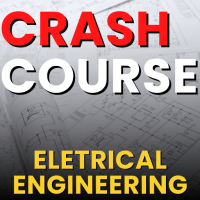Electrical Engineering (EE) Exam > Electrical Engineering (EE) Questions > For a universal motor, the rated supply curre...
Start Learning for Free
For a universal motor, the rated supply current is 10A giving a rated torque of 100 N-m. If a current of 5A is applied, what will be generated torque vary to?
- a)250 N-m
- b)400 N-m
- c)500 N-m
- d)1000 N-m
Correct answer is option 'B'. Can you explain this answer?
Verified Answer
For a universal motor, the rated supply current is 10A giving a rated ...
The torque is proportional to the square of the current.
So the new torque will be 100*(2^2)= 400 N-m.
So the new torque will be 100*(2^2)= 400 N-m.
Most Upvoted Answer
For a universal motor, the rated supply current is 10A giving a rated ...
**Answer:**
To understand how the generated torque varies with the applied current in a universal motor, we need to consider the torque-speed characteristics of the motor.
**Torque-Speed Characteristics of a Universal Motor:**
- A universal motor is a type of electric motor that can operate on both AC and DC power sources.
- It is commonly used in applications where high torque and variable speed are required, such as power tools and vacuum cleaners.
- The torque-speed characteristics of a universal motor are non-linear and can be represented by a graph.
**Rated Supply Current and Rated Torque:**
- The rated supply current of 10A corresponds to the maximum current that can be safely drawn from the power source to operate the motor.
- The rated torque of 100 N-m corresponds to the maximum torque that the motor can produce when operated at the rated supply current.
**Relationship between Current and Torque:**
- In a universal motor, the torque produced is directly proportional to the current flowing through the motor windings.
- Therefore, if a current of 5A is applied, the generated torque will be half of the rated torque.
**Calculation:**
- Given that the rated supply current is 10A and the rated torque is 100 N-m.
- When a current of 5A is applied, the generated torque can be calculated using the formula:
Generated Torque = (Applied Current / Rated Current) * Rated Torque
= (5A / 10A) * 100 N-m
= 50 N-m
- Therefore, the generated torque when a current of 5A is applied is 50 N-m.
**Conclusion:**
- The generated torque will vary linearly with the applied current in a universal motor.
- In this case, when a current of 5A is applied, the generated torque will be 50 N-m, which is half of the rated torque of 100 N-m.
- Therefore, the correct answer is option 'B' - 400 N-m.
To understand how the generated torque varies with the applied current in a universal motor, we need to consider the torque-speed characteristics of the motor.
**Torque-Speed Characteristics of a Universal Motor:**
- A universal motor is a type of electric motor that can operate on both AC and DC power sources.
- It is commonly used in applications where high torque and variable speed are required, such as power tools and vacuum cleaners.
- The torque-speed characteristics of a universal motor are non-linear and can be represented by a graph.
**Rated Supply Current and Rated Torque:**
- The rated supply current of 10A corresponds to the maximum current that can be safely drawn from the power source to operate the motor.
- The rated torque of 100 N-m corresponds to the maximum torque that the motor can produce when operated at the rated supply current.
**Relationship between Current and Torque:**
- In a universal motor, the torque produced is directly proportional to the current flowing through the motor windings.
- Therefore, if a current of 5A is applied, the generated torque will be half of the rated torque.
**Calculation:**
- Given that the rated supply current is 10A and the rated torque is 100 N-m.
- When a current of 5A is applied, the generated torque can be calculated using the formula:
Generated Torque = (Applied Current / Rated Current) * Rated Torque
= (5A / 10A) * 100 N-m
= 50 N-m
- Therefore, the generated torque when a current of 5A is applied is 50 N-m.
**Conclusion:**
- The generated torque will vary linearly with the applied current in a universal motor.
- In this case, when a current of 5A is applied, the generated torque will be 50 N-m, which is half of the rated torque of 100 N-m.
- Therefore, the correct answer is option 'B' - 400 N-m.

|
Explore Courses for Electrical Engineering (EE) exam
|

|
Question Description
For a universal motor, the rated supply current is 10A giving a rated torque of 100 N-m. If a current of 5A is applied, what will be generated torque vary to?a)250 N-mb)400 N-mc)500 N-md)1000 N-mCorrect answer is option 'B'. Can you explain this answer? for Electrical Engineering (EE) 2025 is part of Electrical Engineering (EE) preparation. The Question and answers have been prepared according to the Electrical Engineering (EE) exam syllabus. Information about For a universal motor, the rated supply current is 10A giving a rated torque of 100 N-m. If a current of 5A is applied, what will be generated torque vary to?a)250 N-mb)400 N-mc)500 N-md)1000 N-mCorrect answer is option 'B'. Can you explain this answer? covers all topics & solutions for Electrical Engineering (EE) 2025 Exam. Find important definitions, questions, meanings, examples, exercises and tests below for For a universal motor, the rated supply current is 10A giving a rated torque of 100 N-m. If a current of 5A is applied, what will be generated torque vary to?a)250 N-mb)400 N-mc)500 N-md)1000 N-mCorrect answer is option 'B'. Can you explain this answer?.
For a universal motor, the rated supply current is 10A giving a rated torque of 100 N-m. If a current of 5A is applied, what will be generated torque vary to?a)250 N-mb)400 N-mc)500 N-md)1000 N-mCorrect answer is option 'B'. Can you explain this answer? for Electrical Engineering (EE) 2025 is part of Electrical Engineering (EE) preparation. The Question and answers have been prepared according to the Electrical Engineering (EE) exam syllabus. Information about For a universal motor, the rated supply current is 10A giving a rated torque of 100 N-m. If a current of 5A is applied, what will be generated torque vary to?a)250 N-mb)400 N-mc)500 N-md)1000 N-mCorrect answer is option 'B'. Can you explain this answer? covers all topics & solutions for Electrical Engineering (EE) 2025 Exam. Find important definitions, questions, meanings, examples, exercises and tests below for For a universal motor, the rated supply current is 10A giving a rated torque of 100 N-m. If a current of 5A is applied, what will be generated torque vary to?a)250 N-mb)400 N-mc)500 N-md)1000 N-mCorrect answer is option 'B'. Can you explain this answer?.
Solutions for For a universal motor, the rated supply current is 10A giving a rated torque of 100 N-m. If a current of 5A is applied, what will be generated torque vary to?a)250 N-mb)400 N-mc)500 N-md)1000 N-mCorrect answer is option 'B'. Can you explain this answer? in English & in Hindi are available as part of our courses for Electrical Engineering (EE).
Download more important topics, notes, lectures and mock test series for Electrical Engineering (EE) Exam by signing up for free.
Here you can find the meaning of For a universal motor, the rated supply current is 10A giving a rated torque of 100 N-m. If a current of 5A is applied, what will be generated torque vary to?a)250 N-mb)400 N-mc)500 N-md)1000 N-mCorrect answer is option 'B'. Can you explain this answer? defined & explained in the simplest way possible. Besides giving the explanation of
For a universal motor, the rated supply current is 10A giving a rated torque of 100 N-m. If a current of 5A is applied, what will be generated torque vary to?a)250 N-mb)400 N-mc)500 N-md)1000 N-mCorrect answer is option 'B'. Can you explain this answer?, a detailed solution for For a universal motor, the rated supply current is 10A giving a rated torque of 100 N-m. If a current of 5A is applied, what will be generated torque vary to?a)250 N-mb)400 N-mc)500 N-md)1000 N-mCorrect answer is option 'B'. Can you explain this answer? has been provided alongside types of For a universal motor, the rated supply current is 10A giving a rated torque of 100 N-m. If a current of 5A is applied, what will be generated torque vary to?a)250 N-mb)400 N-mc)500 N-md)1000 N-mCorrect answer is option 'B'. Can you explain this answer? theory, EduRev gives you an
ample number of questions to practice For a universal motor, the rated supply current is 10A giving a rated torque of 100 N-m. If a current of 5A is applied, what will be generated torque vary to?a)250 N-mb)400 N-mc)500 N-md)1000 N-mCorrect answer is option 'B'. Can you explain this answer? tests, examples and also practice Electrical Engineering (EE) tests.

|
Explore Courses for Electrical Engineering (EE) exam
|

|
Signup for Free!
Signup to see your scores go up within 7 days! Learn & Practice with 1000+ FREE Notes, Videos & Tests.


















